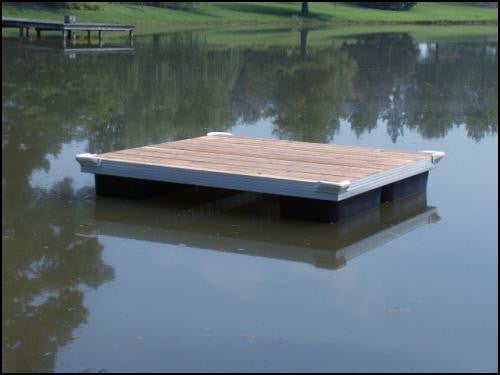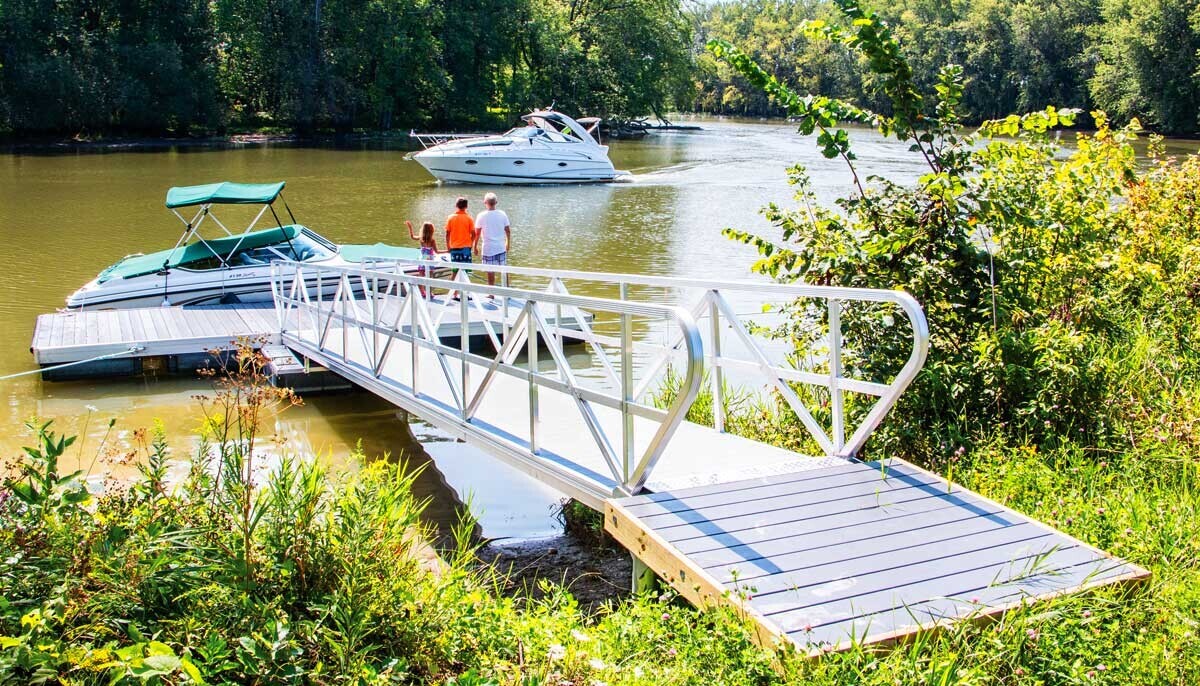Top Reasons to Partner with a Reliable Floating Dock Company for Your Next Venture
The Ultimate Overview to Selecting the most effective Floating Docks
Picking the ideal floating dock requires an extensive understanding of numerous elements that affect both efficiency and durability. Elements such as dock kinds, materials, and vital functions dramatically impact your decision-making procedure. Additionally, factors to consider around setup and budget plan can better make complex the selection. By checking out these aspects methodically, one can make sure an investment that not just fulfills prompt needs yet also improves overall home value. As we explore these vital components, it becomes clear that the appropriate choices can cause a practical and long lasting option tailored to your specific demands.
Recognizing Floating Dock Kind
When choosing a floating dock, it is necessary to comprehend the different kinds offered, as each offers distinctive purposes and applications. Floating docks largely fall under 3 classifications: modular, fixed, and pontoon docks.
Modular docks are made up of private areas that can be easily constructed or reconfigured, making them ideal for changing water levels and varied uses, such as industrial operations or entertainment activities. Their adaptability permits customization based on details demands.

Pontoon docks are defined by their resilient framework, commonly composed of multiple pontoons that offer security and support. They are especially well-suited for larger vessels and are generally used in marinas or for waterfront residential or commercial properties. Recognizing these kinds help in choosing the most appropriate floating dock to satisfy details requirements, making sure optimal performance and safety and security.
Trick Materials for Resilience
Choosing the appropriate materials for floating docks dramatically effects their resilience and durability. One of the most usual products consist of wood, plastic, metal, and composite materials, each offering unique benefits and constraints.
Wood, typically preferred for its aesthetic appeal, requires routine maintenance to withstand moisture and degeneration. Pressure-treated lumber can improve resistance to rot, but it may still be at risk to bugs and weathering.

Plastic docks, made from high-density polyethylene (HDPE), are resistant to rust, UV radiation, and influence, making them a popular choice for seaside atmospheres. Their lightweight nature additionally facilitates simple installment and relocation.
Steel docks, normally built from light weight aluminum or galvanized steel, offer phenomenal strength and longevity. They are immune to deterioration, especially when dealt with, but may need added insulation to stop warmth build-up in warm environments.
Composite materials, integrating wood fibers and plastics, deliver the benefits of both wood and plastic, resisting wetness and fading while requiring very little upkeep. - floating dock services
Inevitably, the selection of products must line up with environmental problems, meant usage, and upkeep choices to make certain the floating dock continues to be functional and visually pleasing in time.
Essential Functions to Consider
While the choice of materials is essential, thinking about important attributes for floating docks is blog equally important to ensure optimum performance and customer complete satisfaction. One key feature to examine is the dock's buoyancy capacity, which establishes just how much weight it can sustain without submerging. floating docks. This is crucial for suiting watercrafts, individual watercraft, and also leisure tasks
In addition, portability is a substantial factor to consider. Depending on your needs, you might want a dock that is simple to disassemble and deliver, especially if you plan to transfer it seasonally. Security is one more vital feature; a properly designed floating dock should decrease activity triggered by wind and water currents, supplying a protected system for users.
Safety and security features, such as non-slip surface areas and rounded sides, are additionally critical to avoid accidents, specifically in damp conditions. Take into consideration the availability of accessories, such as cleats, ladders, and bumpers, which can boost the capability of your dock.
Setup and Upkeep Tips
Establishing and maintaining a drifting dock needs cautious preparation and focus to information to guarantee its long life and optimal performance. Begin by selecting an ideal area that lessens direct exposure to strong currents and waves, which can create wear and tear. Make sure that the water deepness suffices for the dock's height which it is anchored firmly to stop activity.
During setup, comply with the producer's guidelines closely, as improper setting up can compromise stability. Use top quality materials resistant to deterioration, such as light weight aluminum or treated wood, to improve durability. Regularly evaluate all parts, including floats, ports, and securing systems, for indicators of damages or wear.
If your dock makes use of flotation tools, guarantee they remain undamaged and cost-free from slits. By adhering to these installation and upkeep ideas, you can blog here delight in a trustworthy and functional floating dock for years to come.
Budgeting for Your Dock
Budgeting for your dock is an important action that can significantly affect your total satisfaction and investment in a waterfront property. Establishing a clear spending plan assists you navigate the various choices available and ensures you make educated choices that line up with your economic capacities.
Begin by figuring out the dimension and layout of the dock you require, as these aspects will substantially affect the expense. Floating docks can vary considerably in price, depending upon materials, buoyancy, and attributes like ramps and accessories. Research different suppliers and providers to contrast rates and recognize the market value.
In addition to first expenses, take into consideration continuous expenses such as maintenance, insurance policy, and prospective repairs. Assign funds for these persisting expenses to avoid shocks down the line. It's additionally prudent to allocate any kind of necessary permits or inspections, which may be needed by neighborhood regulations.
Last but not least, bear in mind the prospective return on investment. A well-planned dock can boost your residential property's value and appeal, giving a favorable economic impact in the lengthy term. By budgeting efficiently, you can make sure that your dock meets your demands without compromising your economic security.
Verdict
To conclude, choosing the ideal floating dock demands a detailed analysis of various elements, consisting of dock types, products, important features, and installation procedures. Focusing on resilience and compliance with local policies inevitably enhances functionality and residential property worth. Cautious factor to consider of budgetary constraints will better ensure a sound financial investment. By adhering to these guidelines, individuals can make informed choices that promote long-lasting contentment and usability in water settings.

While the selection of materials is critical, considering vital features for floating docks is similarly important to make certain optimal efficiency and individual fulfillment.Establishing up and maintaining a floating dock calls for cautious planning and attention to detail to guarantee its longevity and optimal performance. Floating docks can vary considerably in rate, depending on materials, buoyancy, and attributes like devices and ramps.In final thought, picking the ideal floating dock demands a detailed analysis of numerous elements, consisting of dock types, materials, important functions, and installation procedures.